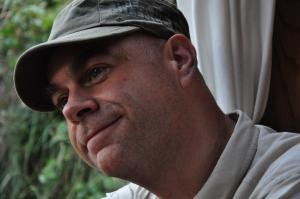Speaker: Nicolai Marquardt, University College London
Date/Time: 1-2pm April 13, 2015
Location: CS1.33a, University of St Andrews
Abstract:
Despite the ongoing proliferation of devices and form-factors such as tablets and electronic whiteboards, technology often hinders (rather than helps) informal small-group interactions. Whereas natural human conversation is fluid and dynamic, discussions that rely on digital content—slides, documents, clippings—often remain hindered due to the awkwardness of manipulating, sharing, and displaying information on and across multiple devices. Addressing these shortcomings, in this talk I present our research towards fluid, ad-hoc, minimally disruptive techniques for co-located collaboration by leveraging the proxemics of people as well as the proxemics of devices. In particular, I will demonstrate a number of cross-device interaction techniques—situated within the research theme of proxemic interactions—that support nuanced gradations of sharing. I will also introduce different novel hybrid sensing approaches enabling these interaction techniques and discuss future research directions.
Bio:
Nicolai Marquardt is Lecturer in Physical Computing at University College London. At the UCL Interaction Centre he is working in the research areas of ubiquitous computing, physical user interfaces, proxemic interactions, and interactive surfaces. He is co-author of the books Proxemic Interactions: From Theory to Practice (Morgan & Claypool 2015) and Sketching User Experiences: The Workbook (Elsevier, Morgan Kaufmann 2012).
This seminar is part of our ongoing series from researchers in HCI. See here for our current schedule.
Following on from Nicolai Marquardt’s successful talk his slides can now be viewed here: St Andrews guest lecture Nicolai Marquardt – Slide Presentation
Event details
- When: 13th April 2015 13:00 - 14:00
- Where: Cole 1.33a
- Format: Seminar


